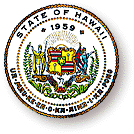
Three days after ordering all state departments to fire their student helpers, the Lingle administration has decided to let libraries, schools and the university keep using them, state Librarian Virginia Lowell said yesterday. Lingle backs off
firing student helpThe library system, schools and UH
will be allowed to keep using the studentsBy Susan Essoyan
sessoyan@starbulletin.comIn a memo to department heads on Monday, citing "worsening deficiencies in our financial resources," Budget Director Georgina Kawamura said all student helpers and interns must be terminated by June 30.
The library system, which relies heavily on the minimum-wage workers, quickly asked for an exemption. At yesterday's Board of Education meeting at Aiea Intermediate School, Lowell announced that she had just received a phone call saying her request was granted.
The state Department of Budget & Finance also informed her that the University of Hawaii and the Department of Education would be exempt as well, she said.
Student helpers provide the library system with 3,100 hours of work each week, sorting and re-shelving books, and eliminating them would force cutbacks in public service, Lowell said.
"The use of student helpers is a very cost-effective alternative to the use of only civil-service employees," Lowell said. "Without them, work that is being performed at $5.75 an hour would be done by staff earning at least $9 an hour."
Board Chairman Herbert Watanabe welcomed the news, saying that the move would have had a "devastating impact" on the Department of Education as well.
Also at yesterday's meeting, board members heard from David Shreve, Education Committee chairman for the National Conference of State Legislatures, who told them resistance to the No Child Left Behind Act is growing across the country. The law requires states to ensure that all students are proficient in math and reading by 2014.
Shreve said that goal is laudable, but the federal government has not provided anywhere near the money needed to make it happen.
He said his nonpartisan group also considers the law's stringent requirements to be unrealistic, and needless meddling by the federal government in state affairs.
"They're acting like a playground bully," he said, referring to U.S. Department of Education officials who are enforcing the act. "Eventually, as states stand up to them, I think they'll back off."
Hawaii's House of Representatives approved a resolution last week urging state education officials to consider withdrawing from the act unless it is fully funded.
Opting out would require the state to give up some federal funding, but just how much is not yet clear.
Watanabe said the board would try to determine the financial consequences of such action.
State of Hawaii
